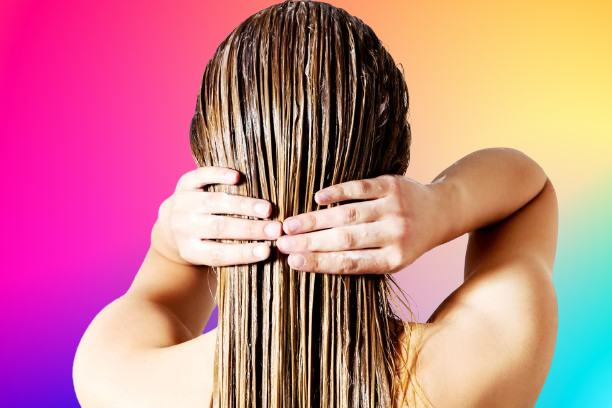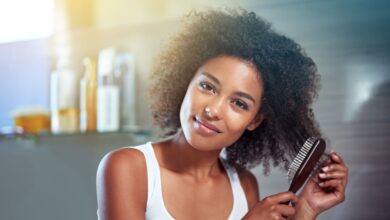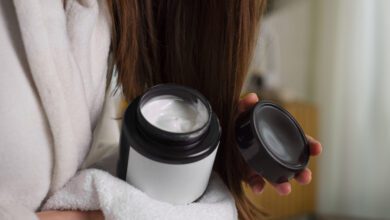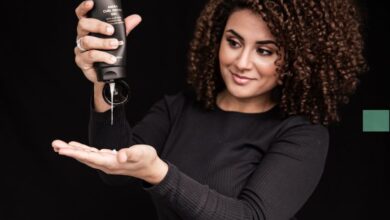Is It Good to Wash Your Hair with Vinegar?

If you’re addicted to hair products or have ever skipped a few days’ worth of hair washing, you are familiar with the unpleasant sensation of product and oil buildup. Your scalp may have an enduring layer of product after using dry shampoo, hairspray, and styling creams for multiple times, which is impossible to remove with repeated washings. Living in an area with soft water, which can make hair seem slick, is particularly true in this regard.
The good news is that you can probably find apple cider vinegar in your kitchen cabinet, which is a terrific (and economical!) cure. Trichologists and hairstylists nationwide recommend this all-natural remedy for giving your hair a fresh lease of life in a couple of minutes. The homemade component works well as an affordable and frequently more efficient substitute for expensive clarifying shampoos.
When you first open the bottle, you’ll definitely notice a nasty, acidic scent; however, you shouldn’t worry about smelling like salad dressing. Sure, after rinsing, your shower will have a slight vinegar fragrance, but it will quickly fade and you won’t detect any residue on your hair until it dries.
You do, however, need to use caution when applying. Since pure ACV is potent, you can’t just pour a bottle over your head. That will not only strip your hair, but its acidic content may cause your scalp to become burned and irritated. A licensed trichologist and hair stylist with BosleyMD, Gretchen Friese, advises dilution of ACV to one-half tablespoon for every eight ounces of water, gradually increasing the amount dependent on your scalp’s response.
Plastic squeeze bottles and spray bottles are both excellent applicators; Friese advises experimenting to determine the ideal dilution. “Dry hair needs less ACV and oily hair needs more,” she says. “I recommend shampooing first and then saturating the hair with ACV.” Let the solution stay on the scalp for three to five minutes after massaging it in, then rinse and continue conditioning as usual. Depending on the type of hair you have, you should use it frequently, but avoid overdoing it since excessive application might result in brassiness and damage.
Apple cider vinegar can aggravate sensitive skin, thus people with hypersensitive scalps or any kind of skin abrasions or illnesses should avoid using it.
I would not recommend using it until it’s healed or otherwise consulted by your doctor,” says Anita Sun, the hairstylist at Eliut Salon, “if you have any open wounds, such as blister cuts or scabs.” “You should also try not to use it right before or right after a chemical treatment, such as a coloring or keratin job, because the pH can affect the treatment you’re having done.
Here are some advantages of apple cider vinegar for your hair and scalp now that the safety measures have been addressed.
Apple Cider Vinegar’s Advantages
Shines and Preserves Color
ACV is perfect for achieving high shine levels since, in Friese’s opinion, it seals and smoothes the hair cuticle. The protective layer that seals in essential lipids, proteins, and moisture in hair cuticles is supposed to be closed and smoothed by the enzymes from the fermented apple. If your hair has received color treatment, this procedure will save color pigment loss and restore condition and gloss.
Clarifies and Adds Volume
Strands that are limp, straggly, and lifeless are the main indicator of second-day hair. Any appearance of volume can be destroyed by excessive grease, which weighs down the hair on your scalp. ACV may be able to eliminate the weight of those extra oils, which could increase volume in addition to eliminating oil, filth, and product buildup that has clumped up in your hair over time.
Reduces Dandruff and Itchy Scalp
ACV has many positive qualities, but it’s also an anti-inflammatory, which means it can stop bacteria from growing on the scalp (it’s also used as a natural household cleanser!). For those who have itchy scalps or dandruff, this should be a big help.
According to Gina Rivera, the founder of Phenix Salons and the maker of Colours by Gina, “apple cider vinegar helps balance your pH and exfoliate scalp skin, which can minimize dandruff and reduce itching.” It also has antibacterial characteristics that can successfully cure inflammation.
Boosts Hair Growth
ACV’s acidity may be able to help with hair thinning by maintaining a pH balance, even if it isn’t a magic bullet for hair loss. The pH level of hair should be between four and five, however many commercial shampoos can cause this to be off. Including a dose of ACV in your hair regimen will help replenish its levels, clear clogged pores, and promote hair growth if this is the reason behind your hair loss.




